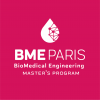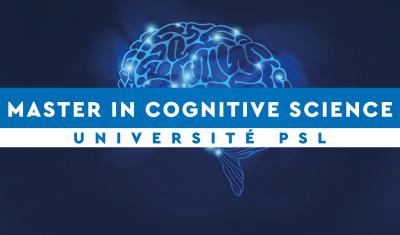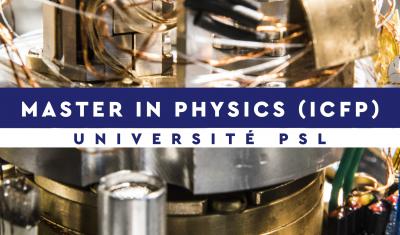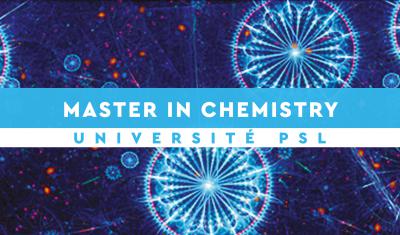“I’m fascinated by cognitive neuroscience, particularly disorders of consciousness and different sleep stages”
Dragana, a native of Macedonia, is a student in the BioMedical Engineering Master’s program run by ESPCI Paris - PSL, MINES Paris - PSL, and École nationale supérieure de Chimie de Paris - PSL. In this portrait, she tells us about her experience with the Master’s program - for which she was awarded a scholarship from the Graduate Program in Life Sciences - her passion for neuroscience, and her volunteer work.
Since she was in high school, Dragana has dreamed of penetrating the mysteries surrounding sleep. The native Macedonian developed her educational plans with this aim in mind.
“I’ve been fascinated by the many questions that sleep raises since I was in high school. I knew that if I wanted to try to tackle them as a professional, I would need to study neuroscience. There are no degrees or research in Macedonia in the field, so I tried to find the best path to reach my goal.”
After some research, she chose the Bachelor’s in Electrical Engineering offered by Saints Cyril and Methodius University of Skopje.
“The courses offered as part of this program, such as biophysics (particularly biosignals and electroencephalography) and neuroimaging processing, gave me a background in neuroscience and let me get my feet wet in the field.”
Having begun her studies at the University of Skopje, Dragana participated in Erasmus+ and CEEPUS in search of new experiences, which she found through exchanges to Prague and later Warsaw.
“I was fortunate to experience three very different university environments with all that implies, including different modes of learning and a different student life. Spending two semesters abroad did so much to enrich my university experience. It’s important not to stay in one place — we have so much to learn beyond our own borders.”
It’s important not to stay in one place. We have so much to learn beyond our own borders
This conviction ultimately led her to continue her studies abroad. She began considering Master’s programs in neuroscience offered in English.
“I was immediately drawn to the Master’s in BioMedical Engineering, which even had courses taught in English. I used LinkedIn to contact a few current students of the program and make sure that it matched what I was looking for. It did. A little more searching revealed that Paris was home to many neuroscience research laboratories. The city looked like an epicenter of European research in neuroscience, and I couldn’t wait to study there!”
From the very beginning, Dragana was struck by how multicultural the program was. There were students from 15 different countries in her class alone! She particularly appreciates the many opportunities to attend cutting-edge scientific lectures based on the high-quality research conducted within PSL’s component schools.
“One talk that had a real impact on me was by György Buzsáki, an incredibly inspiring Professor of Neuroscience at New York University School of Medicine; I was able to attend his lecture at Collège de France. I’ve also had the opportunity to take several very interesting courses from the Master’s in Cognitive Science at ENS-PSL”
Dragana is also motivated by a desire to contribute to society. She has been active in various associations since the age of 14. Her most recent volunteer experience was with the Board of European Students of Technology (BEST), an association present in 90 universities throughout Europe.
“At BEST, I worked in the department whose goal is to improve the quality of higher education in Science, Technology, Engineering, and Mathematics (STEM). My role was to conduct opinion surveys of students to learn how they felt about the education they were receiving and ultimately find ways to improve it. We would write and publish articles to get students’ voices heard by professors and associations specializing in this area. It takes time for innovations to be implemented in higher education, but we had one outstanding success story at BEST: we were involved in the Bologna Process, which in 2010 led to the creation of a European space for higher education.”
Dragana is currently completing an internship at the Paris Brain Institute (ICM) under the direction of Jacobo Sitt, where she is working on disorders of consciousness and states of wakefulness. She hopes to continue on to a PhD and already has a clear idea of the topic she would like to develop.
“I’m fascinated by cognitive neuroscience, and I’m particularly interested in disorders of consciousness and different sleep stages. I’d like to understand how connections in the brain change across different states of wakefulness, stages of sleep, and the circadian rhythm. Which connections determine whether or not a person dreams, is able to listen to a conversation, etc.? It’s a combination of programming, mathematics, and psychology that I find exciting.”
“Asking questions, identifying problems and solving them.” That’s how Dragana likes to describe science. We certainly hope she solves all the mysteries of sleep one day!
The BME Paris Master's degree is the result of a partnership between Université PSL and its components (ESPCI Paris - PSL, École nationale supérieure de Chimie de Paris - PSL, MINES Paris - PSL, ENS - PSL, Institut Curie), the University Paris-Descartes and Arts et Métiers ParisTech. ESPCI Paris is the registration institution for PSL students.




